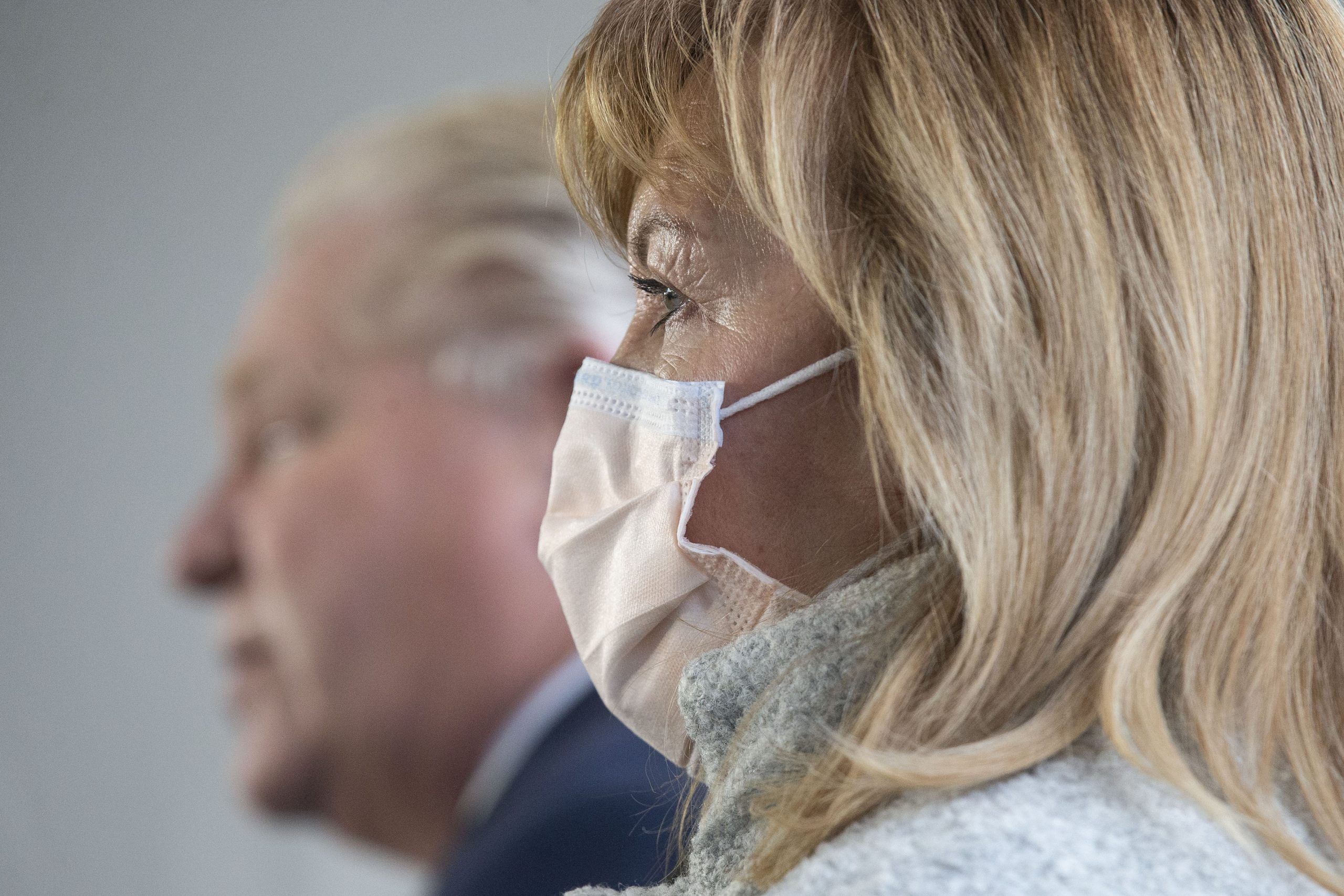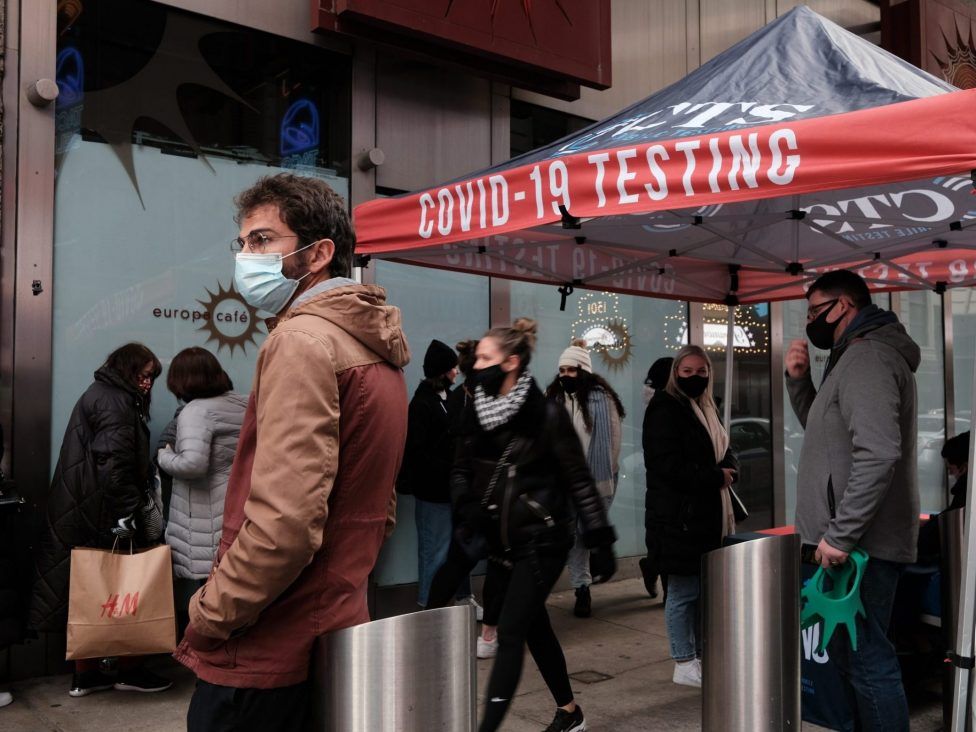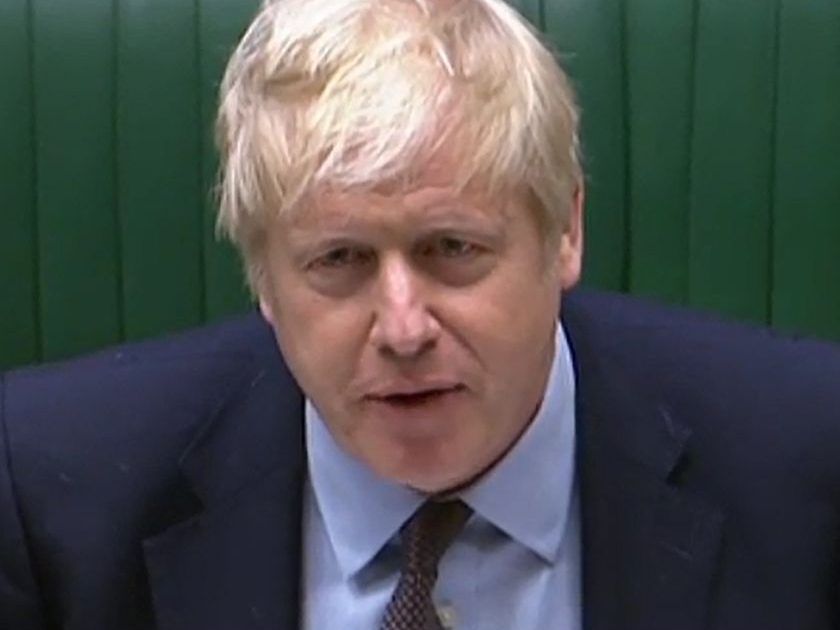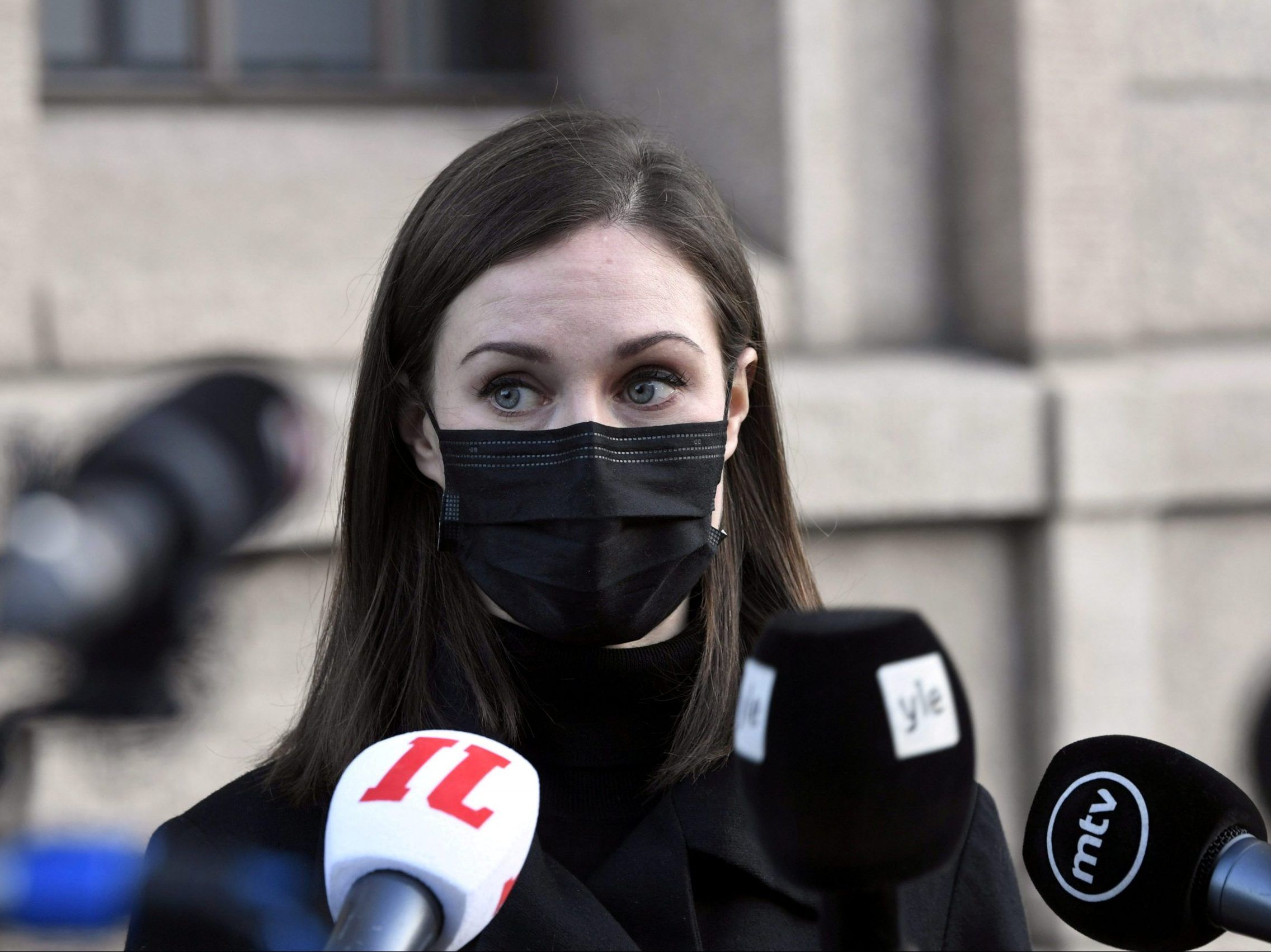im not sure i want to know how the deer were infected.COVID-19 shows up in Canadian wildlife for first time with three Quebec deer infected
Author of the article:
Canadian Press
Canadian Press
Publishing date:
Dec 01, 2021 • 1 day ago • 1 minute read •
7 Comments
A deer is seen at the Michel-Chartrand Park in Longueuil, Que., Friday, Nov. 13, 2020.
A deer is seen at the Michel-Chartrand Park in Longueuil, Que., Friday, Nov. 13, 2020. Photo by Paul Chiasson /THE CANADIAN PRESS
Article content
OTTAWA — For the first time, the COVID-19 virus has been detected in Canadian wildlife.
Advertisement
Story continues below
Article content
Environment Canada says the virus was detected late last month in three wild white-tailed deer in Quebec.
The department says the deer all appeared healthy and showed no clinical signs of COVID-19.
The discovery follows recent reports of the virus spreading among white-tailed deer in the United States.
There has so far been no known transmission of COVID-19 from deer to humans and Environment Canada says it remains “largely a disease of human concern and typically spreads from human to human.”
Still, until more is known, it says anyone exposed to respiratory tissues and fluids from deer should wear a well-fitting mask and avoid splashing of fluids as much as possible.
COVID-19 has infected multiple species of animals, including dogs, cats, farmed mink and zoo animals. But this is the first time in Canada that it has spilled over into wildlife.
Advertisement
Story continues below
Article content
Deer in the Estrie region of Quebec were sampled Nov. 6 to 8. The National Centre for Foreign Animal Disease confirmed the virus in three of them on Monday. The World Organisation for Animal Health was notified on Wednesday.
“As this is the first detection of SARS-CoV-2 in wildlife in Canada, information on the impacts and spread of the virus in wild deer populations is currently limited,” Environment Canada said in a news release Wednesday.
“This finding emphasizes the importance of ongoing surveillance for SARS-CoV-2 in wildlife to increase our understanding about SARS-CoV-2 on the human-animal interface.”

COVID-19 shows up in Canadian wildlife for first time with three Quebec deer infected
OTTAWA — For the first time, the COVID-19 virus has been detected in Canadian wildlife.torontosun.com
COVID-19 'Pandemic'
- Thread starter Ocean Breeze
- Start date
You are using an out of date browser. It may not display this or other websites correctly.
You should upgrade or use an alternative browser.
You should upgrade or use an alternative browser.
“The COVID-19 Vaccines DO NOT Prevent Transmission of the Disease” – Judge Doughty’s Ruling Destroys Biden’s Vax Mandates
By Jim HoftPublished December 2, 2021 at 9:29pm
851 Comments
Forbes Admits mRNA Vaccines Alter DNA Then Changes the Headline
By Jim HoftPublished December 2, 2021 at 5:35pm
639 Comments
**VACCINATIONS AND HOW THIS HAS BEEN USED AS A WEAPON!**
**This is a FACT that the American people were told if they Got Vaccinated they No longer would be required to wear masks and could go on with their Lives!**
**Millions for one reason or another did in fact get the Shot.**
**So what happens. Oh wait you still Must wear a Mask and Strict Mandates still imposed on the American People. So you ask yourself what was the sense in getting the shot.**
**Then these Variants start popping up as they do with a Virus. So we are told NOW You need to get a BOOSTER.**
**When and Where does this end! So people will be Forced to get Booster after Booster Shot.**
**People have had enough and want to go on with their lives no matter what New Variant emerges. **
**Americans are Sick and Tired of the Mandates and Mask Wearing!**
**It is quite obvious that Politicians have used this as a Weapon to force People to comply or else!**
**Their goal is to carry this into the Next Elections so they can use it to benefit themselves in the upcoming Elections!**
**It is very Obvious they don’t want this to ever end and will continue imposing their will on the American People!**
**Now they want to spend Millions on a Vaccination Data Base…This is so Wrong on so Many Levels!**
**Vaccinated people are still getting the Virus and More people have died since Biden has taken office BUT they don’t like to hear or talk about that fact!**
**People have had enough and regardless of whatever may happen just want to go back to Life Variant or No Variant!!!**
**This is a FACT that the American people were told if they Got Vaccinated they No longer would be required to wear masks and could go on with their Lives!**
**Millions for one reason or another did in fact get the Shot.**
**So what happens. Oh wait you still Must wear a Mask and Strict Mandates still imposed on the American People. So you ask yourself what was the sense in getting the shot.**
**Then these Variants start popping up as they do with a Virus. So we are told NOW You need to get a BOOSTER.**
**When and Where does this end! So people will be Forced to get Booster after Booster Shot.**
**People have had enough and want to go on with their lives no matter what New Variant emerges. **
**Americans are Sick and Tired of the Mandates and Mask Wearing!**
**It is quite obvious that Politicians have used this as a Weapon to force People to comply or else!**
**Their goal is to carry this into the Next Elections so they can use it to benefit themselves in the upcoming Elections!**
**It is very Obvious they don’t want this to ever end and will continue imposing their will on the American People!**
**Now they want to spend Millions on a Vaccination Data Base…This is so Wrong on so Many Levels!**
**Vaccinated people are still getting the Virus and More people have died since Biden has taken office BUT they don’t like to hear or talk about that fact!**
**People have had enough and regardless of whatever may happen just want to go back to Life Variant or No Variant!!!**
Pretty much .**VACCINATIONS AND HOW THIS HAS BEEN USED AS A WEAPON!**
**This is a FACT that the American people were told if they Got Vaccinated they No longer would be required to wear masks and could go on with their Lives!**
**Millions for one reason or another did in fact get the Shot.**
**So what happens. Oh wait you still Must wear a Mask and Strict Mandates still imposed on the American People. So you ask yourself what was the sense in getting the shot.**
**Then these Variants start popping up as they do with a Virus. So we are told NOW You need to get a BOOSTER.**
**When and Where does this end! So people will be Forced to get Booster after Booster Shot.**
**People have had enough and want to go on with their lives no matter what New Variant emerges. **
**Americans are Sick and Tired of the Mandates and Mask Wearing!**
**It is quite obvious that Politicians have used this as a Weapon to force People to comply or else!**
**Their goal is to carry this into the Next Elections so they can use it to benefit themselves in the upcoming Elections!**
**It is very Obvious they don’t want this to ever end and will continue imposing their will on the American People!**
**Now they want to spend Millions on a Vaccination Data Base…This is so Wrong on so Many Levels!**
**Vaccinated people are still getting the Virus and More people have died since Biden has taken office BUT they don’t like to hear or talk about that fact!**
**People have had enough and regardless of whatever may happen just want to go back to Life Variant or No Variant!!!**
Anti-vaxxer in Italy wore fake arm to avoid vaccination
Author of the article:
Denette Wilford
Publishing date:
Dec 03, 2021 • 13 hours ago • 1 minute read •
Join the conversation
Nurse Filippa Bua who first saw a man attempting to avoid getting vaccinated by using a fake arm.
Nurse Filippa Bua who first saw a man attempting to avoid getting vaccinated by using a fake arm. Photo by Corriere della Sera
Article content
Fake it ‘til you make it!
Advertisement
Story continues below
Article content
That’s what an anti-vaxxer in Italy hoped would happen when he used a silicone arm to avoid getting jabbed.
Spoiler alert – his attempt failed.
The 50-year-old man was armed with the fake arm at a clinic in Biella in the northern part of the country.
However, since medical staff at the clinic know what an actual arm feels and looks like, they caught on quick when the saw the texture did not match a normal arm. The skin colour was realistic, though, so he gets an A for effort on that front.
Local media reported the man tried to convince the medic to jab his fake arm, even after they realized it was fake.
“A stage costume,” was how he defined it, according to nurse Filippa Bua, who first noticed the man.
“He arrived late in the morning,” Bua told Italian newspaper Corriere della Sera , “I reported to the doctor and then we made a report to communicate it to the superiors.”
It is believed the man was trying to fool medical staff into giving him a Green Pass, which proves the holder has been fully vaccinated against COVID-19 or tested negative or recently recovered from the coronavirus.
Thursday’s fake-arm incident comes as Italy is set to tighten up the rules for unvaccinated citizens.
The man, whose name has not been released, was reported to local police. He now faces fraud charges.

 video.corriere.it
video.corriere.it

 torontosun.com
torontosun.com
Author of the article:
Denette Wilford
Publishing date:
Dec 03, 2021 • 13 hours ago • 1 minute read •
Join the conversation
Nurse Filippa Bua who first saw a man attempting to avoid getting vaccinated by using a fake arm.
Nurse Filippa Bua who first saw a man attempting to avoid getting vaccinated by using a fake arm. Photo by Corriere della Sera
Article content
Fake it ‘til you make it!
Advertisement
Story continues below
Article content
That’s what an anti-vaxxer in Italy hoped would happen when he used a silicone arm to avoid getting jabbed.
Spoiler alert – his attempt failed.
The 50-year-old man was armed with the fake arm at a clinic in Biella in the northern part of the country.
However, since medical staff at the clinic know what an actual arm feels and looks like, they caught on quick when the saw the texture did not match a normal arm. The skin colour was realistic, though, so he gets an A for effort on that front.
Local media reported the man tried to convince the medic to jab his fake arm, even after they realized it was fake.
“A stage costume,” was how he defined it, according to nurse Filippa Bua, who first noticed the man.
“He arrived late in the morning,” Bua told Italian newspaper Corriere della Sera , “I reported to the doctor and then we made a report to communicate it to the superiors.”
It is believed the man was trying to fool medical staff into giving him a Green Pass, which proves the holder has been fully vaccinated against COVID-19 or tested negative or recently recovered from the coronavirus.
Thursday’s fake-arm incident comes as Italy is set to tighten up the rules for unvaccinated citizens.
The man, whose name has not been released, was reported to local police. He now faces fraud charges.

Col braccio in silicone a fare il vaccino, l’infermiera: «L’ha definito un costume di scena»
Parla Filippa Bua: «Era una giornata intensa dal punto di vista emotivo»

Anti-vaxxer in Italy wore fake arm to avoid vaccination
Fake it ‘til you make it! That’s what an anti-vaxxer in Italy hoped would happen when he used a silicone arm to avoid getting jabbed.
Fake letter says cabinet ministers call for arrest of unvaxxed
Author of the article:
Antonella Artuso
Publishing date:
Dec 06, 2021 • 5 hours ago • 1 minute read •
7 Comments
Ontario Health Minister Christine Elliott stands alongside Premier Doug Ford as he takes a question from the media following an announcement at Mississauga Hospital in Mississauga on Wednesday, Dec. 1, 2021.
Ontario Health Minister Christine Elliott stands alongside Premier Doug Ford as he takes a question from the media following an announcement at Mississauga Hospital in Mississauga on Wednesday, Dec. 1, 2021. Photo by Chris Young /THE CANADIAN PRESS
Article content
A fake letter that claims to be from Ontario Health Minister Christine Elliott and Solicitor General Sylvia Jones calls for the apprehension of unvaccinated individuals.
Advertisement
Story continues below
Article content
The communication, addressed to federal Public Safety Minister Bill Blair and federal Health Minister Patty Hajdu, also asks the Trudeau government to hurry completion of five maximum security quarantine facilities to replace “inadequate” COVID-19 quarantine hotels in Canada.
“It has come to our attention that a manufactured letter falsely claiming to be sent from Minister Elliott and Minister Jones on Dec. 3 is circulating online,” a statement from Elliott’s office released Monday says. “No such letter has ever been drafted or sent from Minister Elliott or Minister Jones. Falsifying documents is a criminal offence and as such, this matter has been referred to the Ontario Provincial Police.”
Hajdu was no longer federal Minister of Health on the date of the letter, having been replaced by Liberal MP Jean-Yves Duclos.
There are several other factual errors.
The letter, labelled a “draft,” says Ontario wants “mandatory draft, criminalization and apprehension of Canadians not fully vaccinated” — a position never advocated by Elliott or Jones.
aartuso@postmedia.com

 torontosun.com
torontosun.com
Author of the article:
Antonella Artuso
Publishing date:
Dec 06, 2021 • 5 hours ago • 1 minute read •
7 Comments
Ontario Health Minister Christine Elliott stands alongside Premier Doug Ford as he takes a question from the media following an announcement at Mississauga Hospital in Mississauga on Wednesday, Dec. 1, 2021.
Ontario Health Minister Christine Elliott stands alongside Premier Doug Ford as he takes a question from the media following an announcement at Mississauga Hospital in Mississauga on Wednesday, Dec. 1, 2021. Photo by Chris Young /THE CANADIAN PRESS
Article content
A fake letter that claims to be from Ontario Health Minister Christine Elliott and Solicitor General Sylvia Jones calls for the apprehension of unvaccinated individuals.
Advertisement
Story continues below
Article content
The communication, addressed to federal Public Safety Minister Bill Blair and federal Health Minister Patty Hajdu, also asks the Trudeau government to hurry completion of five maximum security quarantine facilities to replace “inadequate” COVID-19 quarantine hotels in Canada.
“It has come to our attention that a manufactured letter falsely claiming to be sent from Minister Elliott and Minister Jones on Dec. 3 is circulating online,” a statement from Elliott’s office released Monday says. “No such letter has ever been drafted or sent from Minister Elliott or Minister Jones. Falsifying documents is a criminal offence and as such, this matter has been referred to the Ontario Provincial Police.”
Hajdu was no longer federal Minister of Health on the date of the letter, having been replaced by Liberal MP Jean-Yves Duclos.
There are several other factual errors.
The letter, labelled a “draft,” says Ontario wants “mandatory draft, criminalization and apprehension of Canadians not fully vaccinated” — a position never advocated by Elliott or Jones.
aartuso@postmedia.com

Fake letter says cabinet ministers call for arrest of unvaxxed
A fake letter that claims to be from government officials calls for the apprehension of unvaccinated individuals.
Next pandemic could be more lethal than COVID, vaccine creator says
Author of the article:
Reuters
Reuters
Publishing date:
Dec 06, 2021 • 11 hours ago • 1 minute read •
142 Comments
Professor Dame Sarah Gilbert on June 11, 2021.
Professor Dame Sarah Gilbert on June 11, 2021. Photo by Steve Parsons /PA via AP, file
Article content
LONDON — Future pandemics could be even more lethal than COVID-19 so the lessons learned from the outbreak must not be squandered and the world should ensure it is prepared for the next viral onslaught, one of the creators of the Oxford-AstraZeneca vaccine said.
Advertisement
Story continues below
Article content
The novel coronavirus has killed 5.26 million people across the world, according to Johns Hopkins University, wiped out trillions of dollars in economic output and turned life upside down for billions of people.
“The truth is, the next one could be worse. It could be more contagious, or more lethal, or both,” Sarah Gilbert said in the Richard Dimbleby Lecture, the BBC reported. “This will not be the last time a virus threatens our lives and our livelihoods.”
Gilbert, a professor of vaccinology at the University of Oxford, said the world should make sure it is better prepared for the next virus.
“The advances we have made, and the knowledge we have gained, must not be lost,” she said.
Efforts to end the COVID-19 pandemic have been uneven and fragmented, marked by limited access to vaccines in low-income countries while the “healthy and wealthy” in rich countries get boosters, health experts say.
Advertisement
Story continues below
Article content
A panel of health experts set up by the World Health Organization to review the handling of the SARS-CoV-2 pandemic has called for permanent funding and for greater ability to investigate pandemics through a new treaty.
One proposal was for new financing of at least $10 billion a year for pandemic preparedness.
The COVID-19 outbreak was first detected in China in late 2019. Vaccines were developed against the virus in record time.
Gilbert said the Omicron variant’s spike protein contained mutations known to increase the transmissibility of the virus.
“There are additional changes that may mean antibodies induced by the vaccines, or by infection with other variants, may be less effective at preventing infection with Omicron,” Gilbert said.
“Until we know more, we should be cautious, and take steps to slow down the spread of this new variant.”

 torontosun.com
torontosun.com
Author of the article:
Reuters
Reuters
Publishing date:
Dec 06, 2021 • 11 hours ago • 1 minute read •
142 Comments
Professor Dame Sarah Gilbert on June 11, 2021.
Professor Dame Sarah Gilbert on June 11, 2021. Photo by Steve Parsons /PA via AP, file
Article content
LONDON — Future pandemics could be even more lethal than COVID-19 so the lessons learned from the outbreak must not be squandered and the world should ensure it is prepared for the next viral onslaught, one of the creators of the Oxford-AstraZeneca vaccine said.
Advertisement
Story continues below
Article content
The novel coronavirus has killed 5.26 million people across the world, according to Johns Hopkins University, wiped out trillions of dollars in economic output and turned life upside down for billions of people.
“The truth is, the next one could be worse. It could be more contagious, or more lethal, or both,” Sarah Gilbert said in the Richard Dimbleby Lecture, the BBC reported. “This will not be the last time a virus threatens our lives and our livelihoods.”
Gilbert, a professor of vaccinology at the University of Oxford, said the world should make sure it is better prepared for the next virus.
“The advances we have made, and the knowledge we have gained, must not be lost,” she said.
Efforts to end the COVID-19 pandemic have been uneven and fragmented, marked by limited access to vaccines in low-income countries while the “healthy and wealthy” in rich countries get boosters, health experts say.
Advertisement
Story continues below
Article content
A panel of health experts set up by the World Health Organization to review the handling of the SARS-CoV-2 pandemic has called for permanent funding and for greater ability to investigate pandemics through a new treaty.
One proposal was for new financing of at least $10 billion a year for pandemic preparedness.
The COVID-19 outbreak was first detected in China in late 2019. Vaccines were developed against the virus in record time.
Gilbert said the Omicron variant’s spike protein contained mutations known to increase the transmissibility of the virus.
“There are additional changes that may mean antibodies induced by the vaccines, or by infection with other variants, may be less effective at preventing infection with Omicron,” Gilbert said.
“Until we know more, we should be cautious, and take steps to slow down the spread of this new variant.”

Next pandemic could be more lethal than COVID, vaccine creator says
LONDON — Future pandemics could be even more lethal than COVID-19 so the lessons learned from the outbreak must not be squandered and the world should ensure it is …
No more Moderna doses for young men, after millions already given
“The reported rates of myocarditis among males aged 18 to 29 after the second vaccine dose were 15.9 per 100,000 for the Moderna vaccine and 2.6 per 100,000 for the Pfizer.”
Published 22 hours ago on December 6, 2021
By Western Standard
Dr. Robert Malone inventor of the MRNA technology says WTF?Next pandemic could be more lethal than COVID, vaccine creator says
Author of the article:
Reuters
Reuters
Publishing date:
Dec 06, 2021 • 11 hours ago • 1 minute read •
142 Comments
Professor Dame Sarah Gilbert on June 11, 2021.
Professor Dame Sarah Gilbert on June 11, 2021. Photo by Steve Parsons /PA via AP, file
Article content
LONDON — Future pandemics could be even more lethal than COVID-19 so the lessons learned from the outbreak must not be squandered and the world should ensure it is prepared for the next viral onslaught, one of the creators of the Oxford-AstraZeneca vaccine said.
Advertisement
Story continues below
Article content
The novel coronavirus has killed 5.26 million people across the world, according to Johns Hopkins University, wiped out trillions of dollars in economic output and turned life upside down for billions of people.
“The truth is, the next one could be worse. It could be more contagious, or more lethal, or both,” Sarah Gilbert said in the Richard Dimbleby Lecture, the BBC reported. “This will not be the last time a virus threatens our lives and our livelihoods.”
Gilbert, a professor of vaccinology at the University of Oxford, said the world should make sure it is better prepared for the next virus.
“The advances we have made, and the knowledge we have gained, must not be lost,” she said.
Efforts to end the COVID-19 pandemic have been uneven and fragmented, marked by limited access to vaccines in low-income countries while the “healthy and wealthy” in rich countries get boosters, health experts say.
Advertisement
Story continues below
Article content
A panel of health experts set up by the World Health Organization to review the handling of the SARS-CoV-2 pandemic has called for permanent funding and for greater ability to investigate pandemics through a new treaty.
One proposal was for new financing of at least $10 billion a year for pandemic preparedness.
The COVID-19 outbreak was first detected in China in late 2019. Vaccines were developed against the virus in record time.
Gilbert said the Omicron variant’s spike protein contained mutations known to increase the transmissibility of the virus.
“There are additional changes that may mean antibodies induced by the vaccines, or by infection with other variants, may be less effective at preventing infection with Omicron,” Gilbert said.
“Until we know more, we should be cautious, and take steps to slow down the spread of this new variant.”

Next pandemic could be more lethal than COVID, vaccine creator says
LONDON — Future pandemics could be even more lethal than COVID-19 so the lessons learned from the outbreak must not be squandered and the world should ensure it is …torontosun.com
Toronto Medical Officer undergoing cancer surgery
Dr. Eileen de Villa taking temporary leave after mammogram uncovered 'pre-cancerous cells'
Author of the article:
Bryan Passifiume
Publishing date:
Dec 07, 2021 • 7 hours ago • 1 minute read •
20 Comments
Toronto Medical Officer of Health Dr. Eileen de Villa.
Toronto Medical Officer of Health Dr. Eileen de Villa. Photo by Screengrab
Article content
Toronto’s top doctor is temporarily stepping aside to deal with a personal health issue.
Advertisement
Story continues below
Article content
Dr. Eileen de Villa, who alongside Mayor John Tory became the face of the city’s COVID-19 response, announced Tuesday she was temporarily stepping down from her role as Medical Officer of Health after troubling results from a routine mammogram.
Can you be allergic to extreme temperatures?
Tracker dslogo
“The mammogram, and the testing that followed thereafter, identified precancerous cells,” de Villa wrote in the Tuesday afternoon statement.
“These cells need to be removed through surgery, which I am scheduled to undergo tomorrow.”
Deputy Medical Officer Dr. Na-Koshie Lamptey will assume de Villa’s duties while she recovers.
Mayor Tory issued a statement wishing de Villa a speedy recovery, calling her work “key” to Toronto’s fight against COVID-19.
De Villa, who promised to return to work on Dec. 20, urged women to take part in recommended screening programs.
“My story is not unique,” she wrote.
“Women throughout Toronto receive news like this every day.”
bpassifiume@postmedia.com
On Twitter: @bryanpassifiume

 torontosun.com
torontosun.com
Dr. Eileen de Villa taking temporary leave after mammogram uncovered 'pre-cancerous cells'
Author of the article:
Bryan Passifiume
Publishing date:
Dec 07, 2021 • 7 hours ago • 1 minute read •
20 Comments
Toronto Medical Officer of Health Dr. Eileen de Villa.
Toronto Medical Officer of Health Dr. Eileen de Villa. Photo by Screengrab
Article content
Toronto’s top doctor is temporarily stepping aside to deal with a personal health issue.
Advertisement
Story continues below
Article content
Dr. Eileen de Villa, who alongside Mayor John Tory became the face of the city’s COVID-19 response, announced Tuesday she was temporarily stepping down from her role as Medical Officer of Health after troubling results from a routine mammogram.
Can you be allergic to extreme temperatures?
Tracker dslogo
“The mammogram, and the testing that followed thereafter, identified precancerous cells,” de Villa wrote in the Tuesday afternoon statement.
“These cells need to be removed through surgery, which I am scheduled to undergo tomorrow.”
Deputy Medical Officer Dr. Na-Koshie Lamptey will assume de Villa’s duties while she recovers.
Mayor Tory issued a statement wishing de Villa a speedy recovery, calling her work “key” to Toronto’s fight against COVID-19.
De Villa, who promised to return to work on Dec. 20, urged women to take part in recommended screening programs.
“My story is not unique,” she wrote.
“Women throughout Toronto receive news like this every day.”
bpassifiume@postmedia.com
On Twitter: @bryanpassifiume

Toronto Medical Officer undergoing cancer surgery
Dr. Eileen de Villa taking temporary leave after mammogram uncovered 'pre-cancerous cells'
Two years into this pandemic, the world is dangerously unprepared for the next one, report says
Author of the article:
Washington Post
Washington Post
Lena H. Sun, The Washington Post
Publishing date:
Dec 08, 2021 • 20 hours ago • 5 minute read •
30 Comments
Groups of people line up to get tested for COVID-19 in New York City's Times Square, Sunday, Dec. 5, 2021.
Groups of people line up to get tested for COVID-19 in New York City's Times Square, Sunday, Dec. 5, 2021. Photo by Spencer Platt /Getty Images
Article content
Nearly two years into a coronavirus pandemic that has killed more than 5 million people, every country, including the United States, remains dangerously unprepared to respond to future epidemic and pandemic threats, according to a report released Wednesday assessing the efforts of 195 countries.
Advertisement
Story continues below
Article content
Researchers compiling the Global Health Security Index – a project of the Nuclear Threat Initiative, a D.C.-based nonprofit global security group, and the Johns Hopkins Center for Health Security at the Bloomberg School of Public Health – found insufficient capacity in every country, which they said left the world vulnerable to future health emergencies, including some that might be more devastating than covid-19.
The assessment of each country’s ability to prevent, detect and respond to health emergencies in 2021 was based on public information. Researchers also weighed other factors, such as public confidence in government. The average country score for 2021 was 38.9 out of a possible 100 points, essentially unchanged from 2019. No country scored above 75.9.
Advertisement
Story continues below
Article content
The United States, with its vast wealth and scientific capability, maintained its top overall ranking – it was also No. 1 when the first index was released in 2019. But the United States also scored lowest on public confidence in government, a key factor associated with high numbers of coronavirus cases and deaths. That factor may explain why other countries that received top marks in 2019 also responded poorly during the pandemic.
Over nearly two years, the report said, U.S. politicians have questioned the motives and messages of health officials and debated the seriousness of the virus and the effectiveness and safety of vaccines. “The result: in many areas of the country, people have been unwilling to comply with public health recommendations that would slow the spread of the virus.”
Advertisement
Story continues below
Article content
The other countries in the top 10: Australia, Finland, Canada, Thailand, Slovenia, the United Kingdom, Germany, South Korea and Sweden.
Although the report identifies preparedness resources and capacities available in a country, it cannot predict how well they will be used in a crisis. “If you were trying to measure places that are at risk for fires, you want to know if the place has fire alarms,” said Jennifer Nuzzo, a senior scholar at Hopkins. “But if you live in a country where the alarms go off and your political leaders tell you, ‘Pay no attention to that alarm, don’t leave the building,'” that doesn’t mean that the fire alarms don’t work, she said.
For instance, it found that the United States had more capacity to prevent and respond to epidemics than any other country, but it also had more reported cases and deaths than any other nation.
Advertisement
Story continues below
Article content
Some countries had a foundation for preparedness that “did not necessarily translate into successfully protecting against the consequences of the disease because they failed to also adequately address high levels of public distrust in government,” the authors wrote.
Nuzzo put it more bluntly. “We started this pandemic with a leg up, and we should have done better,” she said. “If you don’t have public trust in government, you can have the greatest vaccines in the world but people won’t take them.”
Researchers gave credit to countries that demonstrated sustainable efforts that could be applied to a range of disease threats, and that were transparent about their capacities. That’s where countries such as Israel and Singapore lost points, Nuzzo said.
Advertisement
Story continues below
Article content
“We don’t want to give passes to certain countries that we know inherently have the capacity, because we have colleagues there,” she said. “When an outbreak happens, every other country is going to be looking to them and asking if they can contain it, and some countries make it more clear what the answer is.”
The 268-page report found some encouraging signs. It noted big gains in New Zealand’s laboratory strength and disease detective workforce. Although Angola and Rwanda are not among the top-scoring countries, both received generally high praise for their covid-19 responses and saw improvements in their scores from 2019, Nuzzo said.
But although many countries were able to quickly ramp up new labs and create armies of contact tracers to track the spread of the coronavirus, they didn’t develop strategies for creating and scaling responses to future emergencies, the report found.
Advertisement
Story continues below
Article content
Among its recommendations: Countries should allocate funds for health security in their national budgets; international organizations should identify countries most in need of additional support; the private sector should look for ways to partner with governments; and philanthropies should develop new financing mechanisms, such as a global health security matching fund, to prioritize resources.
Tom Frieden, a former director of the Centers for Disease Control and Prevention, agreed with the report’s bottom line. “No country is adequately prepared and there’s a need for urgent action to address that,” he said.
But, he added, “we need assessments that monitor the actual performance of health systems.”
Advertisement
Story continues below
Article content
Frieden, who is chief executive of Resolve to Save Lives, part of the global public health organization Vital Strategies, said his group has developed a global goal for early detection and response to health threats called 7-1-7: Countries should be able to identify a suspected threat within seven days, inform the next levels of public health authority within one day, and mount an effective response within another seven days.
Nuzzo said researchers who produced the 2021 report added measures that reflected some of the lessons learned so far from the coronavirus pandemic, including laboratory strength and quality, medical stockpiles and contact tracing capability. Experts also discussed whether some variables, such as public trust in government, should be given additional weight. But ultimately, they decided against it because it wasn’t clear how much weight to give those factors for future health emergencies.
Two individuals who played key roles in the first report have since joined the Biden administration. Beth Cameron, a vice president at NTI, was tapped in January to lead the Directorate of Global Health Security and Biodefense at the National Security Council (NSC). She had also been the senior director for global health security and biodefense at the NSC under President Barack Obama. Tom Inglesby, director of the Johns Hopkins Center for Health Security, is also a senior adviser for the administration’s covid-19 response at the Department of Health and Human Services.

 torontosun.com
torontosun.com
Author of the article:
Washington Post
Washington Post
Lena H. Sun, The Washington Post
Publishing date:
Dec 08, 2021 • 20 hours ago • 5 minute read •
30 Comments
Groups of people line up to get tested for COVID-19 in New York City's Times Square, Sunday, Dec. 5, 2021.
Groups of people line up to get tested for COVID-19 in New York City's Times Square, Sunday, Dec. 5, 2021. Photo by Spencer Platt /Getty Images
Article content
Nearly two years into a coronavirus pandemic that has killed more than 5 million people, every country, including the United States, remains dangerously unprepared to respond to future epidemic and pandemic threats, according to a report released Wednesday assessing the efforts of 195 countries.
Advertisement
Story continues below
Article content
Researchers compiling the Global Health Security Index – a project of the Nuclear Threat Initiative, a D.C.-based nonprofit global security group, and the Johns Hopkins Center for Health Security at the Bloomberg School of Public Health – found insufficient capacity in every country, which they said left the world vulnerable to future health emergencies, including some that might be more devastating than covid-19.
The assessment of each country’s ability to prevent, detect and respond to health emergencies in 2021 was based on public information. Researchers also weighed other factors, such as public confidence in government. The average country score for 2021 was 38.9 out of a possible 100 points, essentially unchanged from 2019. No country scored above 75.9.
Advertisement
Story continues below
Article content
The United States, with its vast wealth and scientific capability, maintained its top overall ranking – it was also No. 1 when the first index was released in 2019. But the United States also scored lowest on public confidence in government, a key factor associated with high numbers of coronavirus cases and deaths. That factor may explain why other countries that received top marks in 2019 also responded poorly during the pandemic.
Over nearly two years, the report said, U.S. politicians have questioned the motives and messages of health officials and debated the seriousness of the virus and the effectiveness and safety of vaccines. “The result: in many areas of the country, people have been unwilling to comply with public health recommendations that would slow the spread of the virus.”
Advertisement
Story continues below
Article content
The other countries in the top 10: Australia, Finland, Canada, Thailand, Slovenia, the United Kingdom, Germany, South Korea and Sweden.
Although the report identifies preparedness resources and capacities available in a country, it cannot predict how well they will be used in a crisis. “If you were trying to measure places that are at risk for fires, you want to know if the place has fire alarms,” said Jennifer Nuzzo, a senior scholar at Hopkins. “But if you live in a country where the alarms go off and your political leaders tell you, ‘Pay no attention to that alarm, don’t leave the building,'” that doesn’t mean that the fire alarms don’t work, she said.
For instance, it found that the United States had more capacity to prevent and respond to epidemics than any other country, but it also had more reported cases and deaths than any other nation.
Advertisement
Story continues below
Article content
Some countries had a foundation for preparedness that “did not necessarily translate into successfully protecting against the consequences of the disease because they failed to also adequately address high levels of public distrust in government,” the authors wrote.
Nuzzo put it more bluntly. “We started this pandemic with a leg up, and we should have done better,” she said. “If you don’t have public trust in government, you can have the greatest vaccines in the world but people won’t take them.”
Researchers gave credit to countries that demonstrated sustainable efforts that could be applied to a range of disease threats, and that were transparent about their capacities. That’s where countries such as Israel and Singapore lost points, Nuzzo said.
Advertisement
Story continues below
Article content
“We don’t want to give passes to certain countries that we know inherently have the capacity, because we have colleagues there,” she said. “When an outbreak happens, every other country is going to be looking to them and asking if they can contain it, and some countries make it more clear what the answer is.”
The 268-page report found some encouraging signs. It noted big gains in New Zealand’s laboratory strength and disease detective workforce. Although Angola and Rwanda are not among the top-scoring countries, both received generally high praise for their covid-19 responses and saw improvements in their scores from 2019, Nuzzo said.
But although many countries were able to quickly ramp up new labs and create armies of contact tracers to track the spread of the coronavirus, they didn’t develop strategies for creating and scaling responses to future emergencies, the report found.
Advertisement
Story continues below
Article content
Among its recommendations: Countries should allocate funds for health security in their national budgets; international organizations should identify countries most in need of additional support; the private sector should look for ways to partner with governments; and philanthropies should develop new financing mechanisms, such as a global health security matching fund, to prioritize resources.
Tom Frieden, a former director of the Centers for Disease Control and Prevention, agreed with the report’s bottom line. “No country is adequately prepared and there’s a need for urgent action to address that,” he said.
But, he added, “we need assessments that monitor the actual performance of health systems.”
Advertisement
Story continues below
Article content
Frieden, who is chief executive of Resolve to Save Lives, part of the global public health organization Vital Strategies, said his group has developed a global goal for early detection and response to health threats called 7-1-7: Countries should be able to identify a suspected threat within seven days, inform the next levels of public health authority within one day, and mount an effective response within another seven days.
Nuzzo said researchers who produced the 2021 report added measures that reflected some of the lessons learned so far from the coronavirus pandemic, including laboratory strength and quality, medical stockpiles and contact tracing capability. Experts also discussed whether some variables, such as public trust in government, should be given additional weight. But ultimately, they decided against it because it wasn’t clear how much weight to give those factors for future health emergencies.
Two individuals who played key roles in the first report have since joined the Biden administration. Beth Cameron, a vice president at NTI, was tapped in January to lead the Directorate of Global Health Security and Biodefense at the National Security Council (NSC). She had also been the senior director for global health security and biodefense at the NSC under President Barack Obama. Tom Inglesby, director of the Johns Hopkins Center for Health Security, is also a senior adviser for the administration’s covid-19 response at the Department of Health and Human Services.

Two years into this pandemic, the world is dangerously unprepared for the next one, report says
Nearly two years into a coronavirus pandemic that has killed more than 5 million people, every country, including the United States, remains dangerously unprepared …
U.K. PM apologizes for video of staff joking about Christmas lockdown party
Author of the article:
Reuters
Reuters
Publishing date:
Dec 08, 2021 • 22 hours ago • 2 minute read •
Join the conversation
A video grab from footage broadcast by the UK Parliament's Parliamentary Recording Unit (PRU) shows Britain's Prime Minister Boris Johnson speaking during Prime Minister's Question time (PMQs) in the House of Commons in London on May 26, 2021.
A video grab from footage broadcast by the UK Parliament's Parliamentary Recording Unit (PRU) shows Britain's Prime Minister Boris Johnson speaking during Prime Minister's Question time (PMQs) in the House of Commons in London on May 26, 2021. Photo by HANDOUT /AFP via Getty Images
Article content
LONDON — British Prime Minister Boris Johnson apologized on Wednesday after a video surfaced showing his staff laughing and joking about a gathering in Downing Street during a Christmas COVID lockdown last year when such festivities were banned.
Advertisement
Story continues below
Article content
Johnson said he had been furious to see the clip and that, since allegations emerged in the media, he had been repeatedly assured that there had not been a party.
“I apologize unreservedly for the offense that it has caused up and down the country and I apologize for the impression that it gives,” he told parliament, adding that there would be disciplinary action if it was found rules were broken.
Johnson and his ministers have repeatedly denied any rules were broken by the gatherings in late 2020, though the Mirror newspaper said Johnson spoke at a leaving party and that his team had a wine-fueled gathering of around 40 to 50 people.
But in a video aired by ITV , Allegra Stratton, who was then Johnson’s press secretary, was shown at a 2020 Downing Street rehearsal for a daily briefing laughing and joking about the gathering.
Advertisement
Story continues below
Article content
In the video, a Johnson adviser asks Stratton: “I’ve just seen reports on Twitter that there was a Downing Street Christmas party on Friday night — do you recognize those reports?”
Stratton, standing before British flags at an official Downing Street lectern, chuckles and says: “I went home.” She then laughs and smiles.
“Hold on. Hold on. Um. Er. Arh.” She appears lost for words and looks up.
At the time of the Downing Street gathering, tens of millions of people across Britain were banned from meeting close family and friends for a traditional Christmas celebration – or even from bidding farewell to dying relatives.
Reaction to the video was sharp with many people on Twitter expressing disgust that Downing Street appeared to be laughing about breaking rules. Some questioned whether or not the public should obey Johnson if he imposes more COVID restrictions.
Nearly 146,000 people have died from COVID in the United Kingdom and Johnson is weighing up whether to toughen curbs after the discovery of the new Omicron coronavirus variant.
“A sick joke,” read the banner headline on the Daily Mail, Britain’s biggest selling newspaper. “No. 10 Party Clowns” said Metro. The Guardian said: “PM accused of lying after No 10 team filmed joking about party.”
Advertisement
Story continues below
Article content
Johnson has faced intense criticism in recent months over his handling of a sleaze scandal, the awarding of lucrative COVID contracts, the refurbishment of his Downing Street flat and a claim he sought to ensure pets were evacuated from Kabul during the chaotic Western withdrawal.
Opposition Labour Party leader Keir Starmer said the video was an insult to those who had followed lockdown rules when it meant being separated from their families over Christmas.
“They had a right to expect that the government was doing the same. To lie and to laugh about those lies is shameful,” Starmer said in a statement. “The prime minister now needs to come clean, and apologize.”
Ian Blackford of the Scottish National Party, the second-biggest opposition party in parliament, called for Johnson to step down.
Conservative Party lawmaker Roger Gale said that if the House of Commons had been deliberately misled over the party then it would be a resignation matter.

 itv.com
itv.com

 torontosun.com
torontosun.com
Author of the article:
Reuters
Reuters
Publishing date:
Dec 08, 2021 • 22 hours ago • 2 minute read •
Join the conversation
A video grab from footage broadcast by the UK Parliament's Parliamentary Recording Unit (PRU) shows Britain's Prime Minister Boris Johnson speaking during Prime Minister's Question time (PMQs) in the House of Commons in London on May 26, 2021.
A video grab from footage broadcast by the UK Parliament's Parliamentary Recording Unit (PRU) shows Britain's Prime Minister Boris Johnson speaking during Prime Minister's Question time (PMQs) in the House of Commons in London on May 26, 2021. Photo by HANDOUT /AFP via Getty Images
Article content
LONDON — British Prime Minister Boris Johnson apologized on Wednesday after a video surfaced showing his staff laughing and joking about a gathering in Downing Street during a Christmas COVID lockdown last year when such festivities were banned.
Advertisement
Story continues below
Article content
Johnson said he had been furious to see the clip and that, since allegations emerged in the media, he had been repeatedly assured that there had not been a party.
“I apologize unreservedly for the offense that it has caused up and down the country and I apologize for the impression that it gives,” he told parliament, adding that there would be disciplinary action if it was found rules were broken.
Johnson and his ministers have repeatedly denied any rules were broken by the gatherings in late 2020, though the Mirror newspaper said Johnson spoke at a leaving party and that his team had a wine-fueled gathering of around 40 to 50 people.
But in a video aired by ITV , Allegra Stratton, who was then Johnson’s press secretary, was shown at a 2020 Downing Street rehearsal for a daily briefing laughing and joking about the gathering.
Advertisement
Story continues below
Article content
In the video, a Johnson adviser asks Stratton: “I’ve just seen reports on Twitter that there was a Downing Street Christmas party on Friday night — do you recognize those reports?”
Stratton, standing before British flags at an official Downing Street lectern, chuckles and says: “I went home.” She then laughs and smiles.
“Hold on. Hold on. Um. Er. Arh.” She appears lost for words and looks up.
At the time of the Downing Street gathering, tens of millions of people across Britain were banned from meeting close family and friends for a traditional Christmas celebration – or even from bidding farewell to dying relatives.
Reaction to the video was sharp with many people on Twitter expressing disgust that Downing Street appeared to be laughing about breaking rules. Some questioned whether or not the public should obey Johnson if he imposes more COVID restrictions.
Nearly 146,000 people have died from COVID in the United Kingdom and Johnson is weighing up whether to toughen curbs after the discovery of the new Omicron coronavirus variant.
“A sick joke,” read the banner headline on the Daily Mail, Britain’s biggest selling newspaper. “No. 10 Party Clowns” said Metro. The Guardian said: “PM accused of lying after No 10 team filmed joking about party.”
Advertisement
Story continues below
Article content
Johnson has faced intense criticism in recent months over his handling of a sleaze scandal, the awarding of lucrative COVID contracts, the refurbishment of his Downing Street flat and a claim he sought to ensure pets were evacuated from Kabul during the chaotic Western withdrawal.
Opposition Labour Party leader Keir Starmer said the video was an insult to those who had followed lockdown rules when it meant being separated from their families over Christmas.
“They had a right to expect that the government was doing the same. To lie and to laugh about those lies is shameful,” Starmer said in a statement. “The prime minister now needs to come clean, and apologize.”
Ian Blackford of the Scottish National Party, the second-biggest opposition party in parliament, called for Johnson to step down.
Conservative Party lawmaker Roger Gale said that if the House of Commons had been deliberately misled over the party then it would be a resignation matter.

No 10 staff joke in leaked recording about Christmas party they later denied | ITV News
ITV News has obtained a leaked video showing Downing Street staff laughing about a party which was allegedly held in Number 10 last Christmas. | ITV National News

U.K. PM apologizes for video of staff joking about Christmas lockdown party
LONDON — British Prime Minister Boris Johnson apologized on Wednesday after a video surfaced showing his staff laughing and joking about a gathering in Downing Stre…
An unreserved apology, complete with lies and denial of any knowledge!
BoreJo is becoming a true politician.
BoreJo is becoming a true politician.
Finland's PM apologizes for going clubbing despite COVID scare
Author of the article:
Postmedia News
Publishing date:
Dec 09, 2021 • 11 hours ago • 1 minute read •
Join the conversation
Finnish Prime Minister Sanna Marin holds a news conference outside the Finnish Parliament building in Helsinki, Finland Dec. 8, 2021.
Finnish Prime Minister Sanna Marin holds a news conference outside the Finnish Parliament building in Helsinki, Finland Dec. 8, 2021. Photo by Markku Ulander/Lehtikuva /via REUTERS
Article content
She’s not 50 Cent, but Sanna Marin was in da club.
Advertisement
Story continues below
Article content
And now Finland’s prime minister is in some hot water and has apologized after being caught clubbing.
Marin, 36, said she missed an alert warning her that her foreign minister had tested positive for COVID on account of having left her government council phone behind before going out Saturday, according to reports.
She was spotted dancing at a Helsinki club at 4 a.m., the BBC reported.
Since she’s fully vaccinated, Marin said she did not believe she needed to isolate. But then she saw the text Sunday morning telling her she needed to.
Her COVID test reportedly came back negative.
Marin is the world’s youngest prime minister and took office in 2019.
“I should have used better consideration on Saturday night and rehearse the instruction I got another time,” she wrote on Facebook.” I’m really sorry that I didn’t understand how to do this.”

 torontosun.com
torontosun.com
Author of the article:
Postmedia News
Publishing date:
Dec 09, 2021 • 11 hours ago • 1 minute read •
Join the conversation
Finnish Prime Minister Sanna Marin holds a news conference outside the Finnish Parliament building in Helsinki, Finland Dec. 8, 2021.
Finnish Prime Minister Sanna Marin holds a news conference outside the Finnish Parliament building in Helsinki, Finland Dec. 8, 2021. Photo by Markku Ulander/Lehtikuva /via REUTERS
Article content
She’s not 50 Cent, but Sanna Marin was in da club.
Advertisement
Story continues below
Article content
And now Finland’s prime minister is in some hot water and has apologized after being caught clubbing.
Marin, 36, said she missed an alert warning her that her foreign minister had tested positive for COVID on account of having left her government council phone behind before going out Saturday, according to reports.
She was spotted dancing at a Helsinki club at 4 a.m., the BBC reported.
Since she’s fully vaccinated, Marin said she did not believe she needed to isolate. But then she saw the text Sunday morning telling her she needed to.
Her COVID test reportedly came back negative.
Marin is the world’s youngest prime minister and took office in 2019.
“I should have used better consideration on Saturday night and rehearse the instruction I got another time,” she wrote on Facebook.” I’m really sorry that I didn’t understand how to do this.”

Finland's PM apologizes for going clubbing despite COVID scare
She's not 50 Cent, but Sanna Marin was in da club. And now Finland's prime minister has apologized after being caught clubbing.
Sure are a lot of political actors getting caught breaking their own rules world wide . It is almost as if they know it is all b.s.Finland's PM apologizes for going clubbing despite COVID scare
Author of the article:
Postmedia News
Publishing date:
Dec 09, 2021 • 11 hours ago • 1 minute read •
Join the conversation
Finnish Prime Minister Sanna Marin holds a news conference outside the Finnish Parliament building in Helsinki, Finland Dec. 8, 2021.
Finnish Prime Minister Sanna Marin holds a news conference outside the Finnish Parliament building in Helsinki, Finland Dec. 8, 2021. Photo by Markku Ulander/Lehtikuva /via REUTERS
Article content
She’s not 50 Cent, but Sanna Marin was in da club.
Advertisement
Story continues below
Article content
And now Finland’s prime minister is in some hot water and has apologized after being caught clubbing.
Marin, 36, said she missed an alert warning her that her foreign minister had tested positive for COVID on account of having left her government council phone behind before going out Saturday, according to reports.
She was spotted dancing at a Helsinki club at 4 a.m., the BBC reported.
Since she’s fully vaccinated, Marin said she did not believe she needed to isolate. But then she saw the text Sunday morning telling her she needed to.
Her COVID test reportedly came back negative.
Marin is the world’s youngest prime minister and took office in 2019.
“I should have used better consideration on Saturday night and rehearse the instruction I got another time,” she wrote on Facebook.” I’m really sorry that I didn’t understand how to do this.”

Finland's PM apologizes for going clubbing despite COVID scare
She's not 50 Cent, but Sanna Marin was in da club. And now Finland's prime minister has apologized after being caught clubbing.torontosun.com



